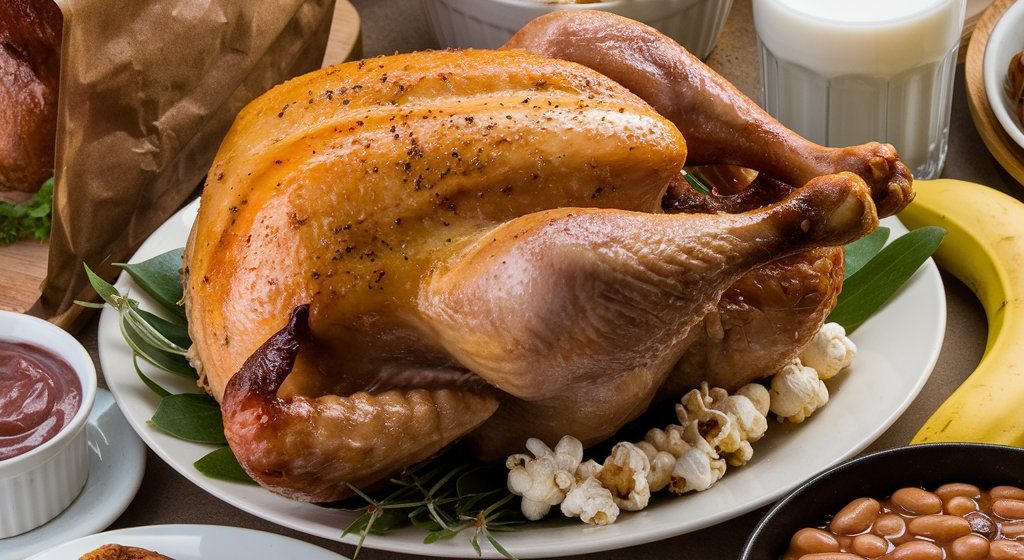Have you ever hit that dreaded midday slump, feeling your energy levels plummet? Or perhaps you’ve noticed your skin looking a little dull and lackluster? Your body might be sending you a signal – a signal for more Vitamin B3, more commonly known as niacin. This essential nutrient is a true powerhouse when it comes to keeping you running at your best. It plays a critical role in converting the food you eat into usable energy, maintaining healthy skin, and supporting the optimal functioning of your nervous and digestive systems.
The good news? You don’t need expensive supplements or complicated diets to harness the power of niacin. This essential vitamin is readily available in a wide array of delicious and common foods. Let’s delve deeper into these niacin-rich champions and explore how they can contribute to your overall well-being.
1. Chicken Breast: Lean, Mean, and Niacin-Rich
Chicken breast is a staple in kitchens across the globe, and for good reason. It’s incredibly versatile, a fantastic source of lean protein, and boasts a surprisingly generous amount of niacin. Just 100 grams of cooked chicken breast provides approximately 14.8 mg of niacin, a significant portion of your recommended daily intake. This protein powerhouse isn’t just about niacin either; it’s packed with essential amino acids crucial for building and repairing tissues, making it a must-have for maintaining a healthy and active lifestyle. Whether grilled, baked, roasted, or sautéed, chicken breast offers a delicious and convenient way to incorporate niacin into your daily diet.
2. Tuna: Reigning Supreme in the Niacin Department
When it comes to niacin content, tuna truly reigns supreme. This nutrient-dense fish packs a whopping 22 mg of niacin per 100 grams cooked, making it one of the richest natural sources available. But tuna’s benefits don’t stop there. It’s brimming with heart-healthy omega-3 fatty acids, renowned for their anti-inflammatory properties and ability to support cardiovascular health. Whether you enjoy it grilled as a steak, flaked in a salad, or simply as a quick and easy canned option, incorporating tuna into your weekly meal plan is an excellent strategy for boosting your niacin intake and reaping its numerous health benefits.
3. Turkey Breast: A Year-Round Nutritional Powerhouse
While turkey often takes center stage during holiday feasts, it deserves a place at your table year-round. Offering around 12 mg of niacin per 100 grams, turkey breast is a fantastic source of lean protein, rivaling chicken in its versatility and ability to shine in countless recipes. But this Thanksgiving favorite offers more than just protein and niacin. It also provides a healthy dose of selenium, a trace mineral that plays a crucial role in supporting your immune system and protecting your cells against damage. So next time you’re planning a meal, consider making turkey a regular guest for a delicious and nutritionally-dense option.
4. Salmon: A Delectable Brain-Boosting Treat
Salmon has earned its place as a nutritional superstar, celebrated not just for its rich flavor but also for its impressive nutrient profile. A 100-gram serving of cooked salmon delivers approximately 8.5 mg of niacin, contributing significantly to your daily needs. Beyond niacin, salmon is bursting with those brain-boosting omega-3 fatty acids, which have been linked to improved cognitive function, reduced risk of age-related mental decline, and even mood regulation. Incorporating salmon into your diet, whether baked, grilled, or smoked, is a delicious way to keep your mind sharp while supporting overall well-being.
5. Peanuts: The Mighty Little Snack Packed with Niacin
For a convenient and satisfying snack that delivers a potent dose of niacin, look no further than humble peanuts. These crunchy legumes offer around 12 mg of niacin per 100 grams, making them a great on-the-go option for boosting your intake. But peanuts are far from a one-trick pony. They’re also a good source of heart-healthy monounsaturated fats, plant-based protein, and fiber, making them a well-rounded snack that satisfies hunger, provides sustained energy, and contributes to overall health.
6. Mushrooms, Especially Portobello: The Umami-Rich Niacin Source
Mushrooms, particularly the large and meaty Portobello variety, are a fantastic plant-based source of niacin, offering around 6 mg per 100 grams cooked. But their benefits go far beyond their niacin content. Mushrooms are naturally low in calories and fat, while being packed with antioxidants, those powerful compounds that protect your cells from damage caused by free radicals. Enjoy Portobellos grilled as a vegetarian burger, roasted as a flavorful side dish, or sautéed and added to soups and stews for an umami-rich, nutrient-packed boost.
7. Brown Rice: The Whole Grain Hero Delivering Niacin and More
Brown rice, a nutritional powerhouse in the world of grains, provides not only sustained energy but also a respectable amount of niacin – about 5 mg per 100 grams cooked. This makes it an excellent choice for those looking for a healthier and more nutritious alternative to refined white rice. Brown rice is a good source of fiber, which is essential for digestive health, regulating blood sugar levels, and promoting satiety. Its versatility shines in countless dishes, from stir-fries and pilafs to hearty soups and as a base for grain bowls.
8. Fortified Breakfast Cereals: A Convenient Jumpstart for Your Day
Many breakfast cereals available today are fortified with essential vitamins and minerals, including niacin. A single serving of fortified cereal can provide anywhere from 20 to 27 mg of niacin, making it a surprisingly easy way to meet a significant portion of your daily needs right at the start of your day. However, it’s important to be mindful of added sugar content when choosing breakfast cereals. Opt for those with lower sugar content and higher fiber content for a healthier and more balanced start to your morning.
9. Lentils: Small but Mighty Contributors to Your Niacin Intake
Lentils may be small, but they are nutritional powerhouses packed with protein, fiber, and, you guessed it, niacin. Offering approximately 2 mg of niacin per 100 grams, lentils are a valuable addition to any diet, particularly for those following a vegetarian or vegan lifestyle. Their versatility shines in soups, stews, salads, or even as a base for veggie burgers, making them an easy and delicious way to increase your niacin intake while enjoying a variety of global flavors.
10. Sunflower Seeds: The Crunchy, Nutrient-Packed Snack
Sunflower seeds, often enjoyed as a snack or sprinkled on salads and yogurt, are another surprisingly good source of niacin, offering around 8 mg per 100 grams. Their nutritional benefits go beyond niacin, as they’re also rich in vitamin E, a potent antioxidant known for its skin-protecting and cell-regenerating properties. Adding a handful of sunflower seeds to your trail mix, incorporating them into homemade granola bars, or simply enjoying them as a snack can provide a satisfying crunch and a boost of essential nutrients, including niacin.
How Much Niacin Do You Need?
The recommended daily intake of niacin varies depending on your age, gender, and life stage:
- Adult Men: 16 mg per day
- Adult Women: 14 mg per day
- Pregnant Women: 18 mg per day
- Breastfeeding Women: 17 mg per day
- Children: 2-16 mg per day, depending on age
By incorporating these niacin-rich foods into your daily diet, you can ensure you’re meeting your body’s needs for this essential nutrient. Remember, a balanced and varied diet is key to achieving optimal health and well-being. Enjoy the journey of exploring new foods and flavors as you discover delicious ways to nourish your body and unlock the power of niacin.

